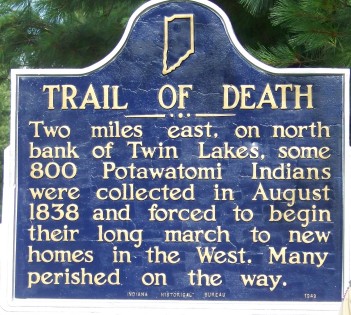
- Details
- By Native News Online Staff
WASHINGTON — A resolution recognizing the forced removal of Potawatomi people from their homelands east of the Mississippi River to Kansas and Oklahoma was introduced by U.S. Senators Todd Young (R-IN), U.S. Senators Gary Peters (D-MI) and Debbie Stabenow (D-MI) last week.
The forced removal is known as the “Potawatomi Trail of Death” because over the course of 61 days in 1838, 40 Potawatomi died along the long and harsh journey.
“The Senate recognizes the special legal and political relationship Indian Tribes have with the United States and the solemn covenant that the Potawatomi people of the United States share with the land; and acknowledges the extreme hardship, violence, and maltreatment inflicted on the Potawatomi people by the United States through the cruel and ill-conceived policy of forcible removal of the Potawatomi people from their homeland east of the Mississippi River,” the Senators said in the resolution.
Part of the resolution reads:
“The Potawatomi people, collectively known as the ‘‘Potawatomi Nation’’, are comprised of members of the many villages, communities, and bands that resided in their homeland in the southern Great Lakes region of the present day States of Ohio, Indiana, Michigan, Illinois, and Wisconsin. Their advanced farming techniques, extensive trade and commerce networks, and well-established transportation routes of the Potawatomi Nation had a significant influence on the early history of North America”
Read the full resolution here.
“The Senate resolution being sponsored by Senator Young acknowledges a profound historical tragedy suffered by Potawatomi people that has deeply affected Potawatomi through the generations and to the present day,” said Pokagon Band of Potawatomi Chairman Matt Wesaw. “We want to express our deep gratitude to Senator Young for opening a dialogue with the Pokagon Band on this important subject, and we also want to thank Senator Stabenow and Senator Peters for stepping forward to co-sponsor this important resolution.”
During the Potawatomi Trail of Death, some Potawatomi fled north in parts of Michigan, Wisconsin and even Canada to escape relocation to the West. Today, four Potawatomi tribes are located in Michigan: the Hannahville Indian Community, the Match-e-be-nash-she-wish Band of Pottawatomi Indians of Michigan (commonly known as the Gun Lake Tribe), Nottawaseppi Huron Band of Potawatomi, and the Pokagon Band of Potawatomi. The Forest County Potawatomi Community is located in Wisconsin.
The resolution points out that the legislative measure “does not seek authorizes or supports any claim against the United States; or serves as a settlement of any claim against 10 the United States.”
It is purely done to recognize the injustice done to the Potawatomi during the time of removal in United States history.
More Stories Like This
Native News Weekly (August 25, 2024): D.C. BriefsUS Presidents in Their Own Words Concerning American Indians
Native News Weekly (December 14, 2025): D.C. Briefs
Wounded Knee Massacre Site Protection Bill Passes Congress
Two Murdered on Colville Indian Reservation
Help us defend tribal sovereignty.
At Native News Online, our mission is rooted in telling the stories that strengthen sovereignty and uplift Indigenous voices — not just at year’s end, but every single day.
Because of your generosity last year, we were able to keep our reporters on the ground in tribal communities, at national gatherings and in the halls of Congress — covering the issues that matter most to Indian Country: sovereignty, culture, education, health and economic opportunity.
That support sustained us through a tough year in 2025. Now, as we look to the year ahead, we need your help right now to ensure warrior journalism remains strong — reporting that defends tribal sovereignty, amplifies Native truth, and holds power accountable.
 The stakes couldn't be higher. Your support keeps Native voices heard, Native stories told and Native sovereignty defended.
The stakes couldn't be higher. Your support keeps Native voices heard, Native stories told and Native sovereignty defended.
Stand with Warrior Journalism today.
Levi Rickert (Potawatomi), Editor & Publisher

